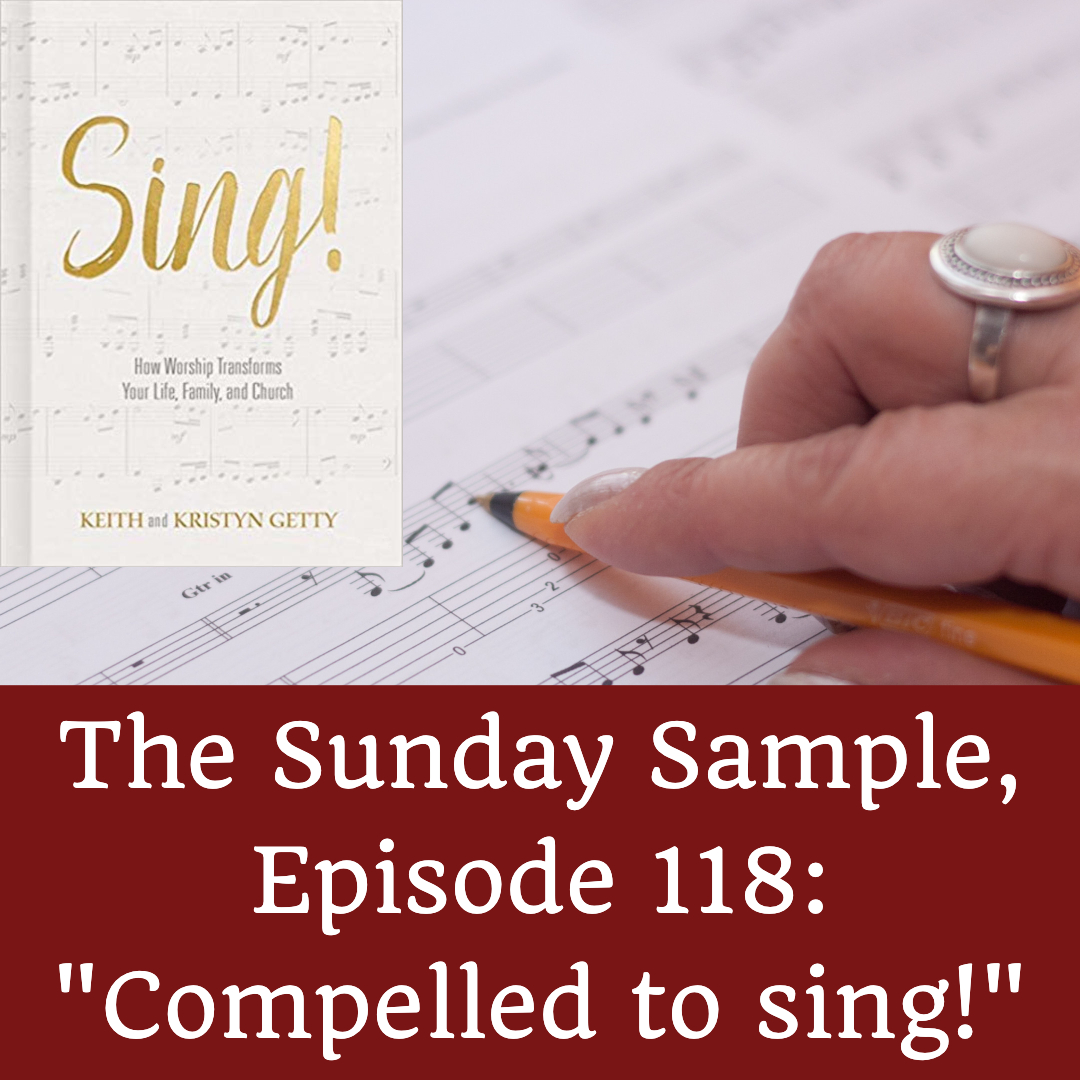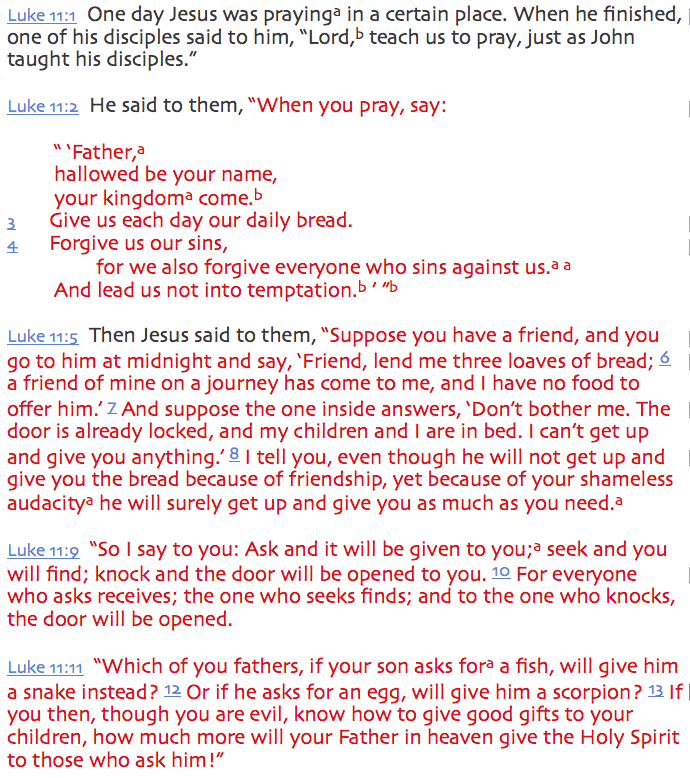The Sunday Sample, Episode 118
Do you ever have difficulty persuading your congregation to engage wholeheartedly with singing? Perhaps you’ve tried everything. Rehearsing more thoroughly, picking familiar songs, pitching them in a comfortable key, making sure the words are visible, upping your game by leading with greater energy, praying passionately and specifically for the congregation to enjoy corporate worship.
Nothing wrong with any of these. Many of my videos and podcasts cover such topics. But now and again we need to go back to basics. Something I’ve been reading has reminded me of this.
I’m in chapter 3 of a terrific little book “Sing!”. It’s written by the Getty’s. The title of the current chapter is, “Compelled to….Sing!”.
Their focus is on the principal that people in touch with their salvation love to sing. They feel compelled to sing. No one has to force them, manipulate them or cajole them into it. Quoting Bob Kauflin,
“Worship isn’t primarily about music, techniques, songs or methodologies. It’s about our hearts. It’s about what and who we love more than anything.”
The key verse about a healthy compulsion is,
“For Christ’s love compels us, because we are convinced that one died for all, and therefore all died. And he died for all, that those who live should no longer live for themselves but for him who died for them and was raised again.” (2 Corinthians 5:14–15 NIV11)
As much as we are compelled by the love of Christ to live for him, it surely must follow that it compels us to sing for him. The Gettys put it beautifully,
“I sing because I’m free to run from all that tore me apart and to run to all that makes me whole.”
Time and time again in the Scriptures people respond to God’s revelatory salvation with songs of praise. Let’s take a quick look at the examples they mention in the book.
- The first song: Exodus 15
- The songs of battle: Judges 4/5; 1 Chronicles 15; 2 Chronicles 20:21-25.
- The songs of David: Psalm 117:1; Psalm 96:2; Psalm 105:2; Psalm 40; Psalm 31.
- The songs of the prophets: Ezra 3:10-13; Nehemiah 12:27-29; Isaiah 52:9; Jeremiah 20:13; Zephaniah 3:14.
- A song that sustains the prisoners: Acts 16:25 (see Romans 8:38-39)
Perhaps your congregation don’t need so much a reminder to sing, as a refresher on the significance of their salvation. Not only salvation. Also the wonderful nature of God in his patience with us as Christians. The extraordinary nature of his ongoing grace. The victories in Christ that he has given us. Seeing friends saved, people married, children of members becoming Christians, spiritual and emotional transformation and much more.
You may say, “Well, fair enough, but that’s the job of the preacher.” I would suggest that a leader of worship cannot hide behind someone else if the corporate worship is not all it could be. Perhaps you need to speak more. Perhaps not. We all have different gifts. But even if you are not to be the person inspiring the members to recall the wonders of their spiritual freedom in Christ, you could be the person to prompt others to do so.
Three teaching suggestions for inspiring your congregation to sing with all their hearts:
- God’s nature. Teach on his love, forbearance, long-suffering, kindness and patience – “Bear in mind that our Lord’s patience means salvation, just as our dear brother Paul also wrote you with the wisdom that God gave him.” (2 Peter 3:15 NIV11)
- Personal salvation. Take people back to when they first got in touch with God’s love and then God’s saving power in baptism – “Come, let us sing for joy to the LORD; let us shout aloud to the Rock of our salvation.” (Psalm 95:1 NIV11); “When they came up out of the water, the Spirit of the Lord suddenly took Philip away, and the eunuch did not see him again, but went on his way rejoicing” (Acts 8:39 NIV11).
- Promises. Remind people where they are going. Moving into ever-increasing Christ-likeness (2 Corinthians 3:18) and trusting that our labour in the Lord is not in vain – “God is not unjust; he will not forget your work and the love you have shown him as you have helped his people and continue to help them.” (Hebrews 6:10 NIV11); “Therefore, my dear brothers and sisters, stand firm. Let nothing move you. Always give yourselves fully to the work of the Lord, because you know that your labor in the Lord is not in vain.” (1 Corinthians 15:58 NIV11).
Either yourself, or the person best suited by gifting could deliver these lessons as the sermon, or a mini-lesson at some point in your Sunday service.
This isn’t a quick fix. It is relatively simple to adapt the pitches of songs to make them more singable. But to teach and preach in such a way as to inspire wholehearted devotion is quite another matter. One lesson won’t fix it. Actually probably shouldn’t. Not if it’s going to have any depth.
As Jack Hayford said (writer of the classic song “Majesty”),
“It’s easier to teach a congregation the Bible than to teach them how to worship.”
It may be harder to teach to worship from the heart, but it is worth it and our God deserves it (click here for the story of how he came to write the song).
Question for today: “What have you seen done effectively that inspires a congregation to sing from the heart?”
Please add your comments on this week’s topic. We learn best when we learn in community.
Do you have a question about teaching the Bible? Is it theological, technical, practical? Send me your questions or suggestions. Here’s the email: malcolm@malcolmcox.org.
If you’d like a copy of my free eBook on spiritual disciplines, “How God grows His people”, sign up at my website: http://www.malcolmcox.org.
Please pass the link on, subscribe, leave a review.
“Worship the LORD with gladness; come before him with joyful songs.” (Psalms 100:2 NIV11)
God bless, Malcolm
PS: You might also be interested in my book: “An elephant’s swimming pool”, a devotional look at the Gospel of John



